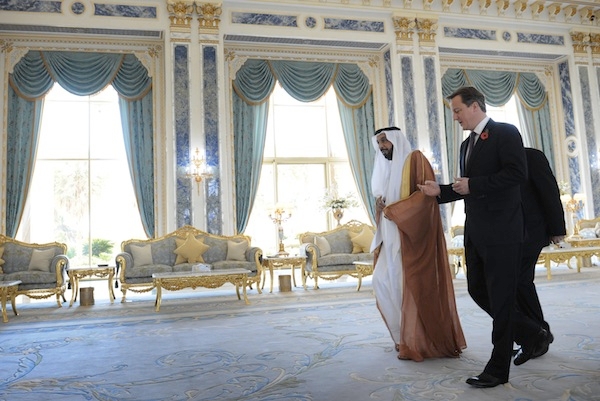David Cameron is on a tricky tour of the Gulf states this week. It’s not so much that he’s trying to sell arms to the countries he visits: 300,000 British jobs do depend on the defence industry, with 65,000 relying specifically on arms sales. But he is having to tread very carefully on the subject of human rights. Arab countries are uneasy with the way Britain has embraced the Arab Spring, while Britain remains uneasy about those countries’ record on how they treat their subjects.
This morning, in an interview with the BBC’s Frank Gardner, the Prime Minister sought to reassure critics that he will raise rights records with the leaders he meets, but that there was nothing wrong with trying to sell Typhoon jets to Dubai and Saudi Arabia. He said:
‘There’s nothing off limits in any of these relationships and we discuss human rights, we discuss all of these concerns. But I do think we should recognise the difference between different countries. We shouldn’t lump all countries together, and say it’s exactly the same situation in Libya and Syria and Bahrain – that is not the case.
‘I’m a believer in the Arab Spring; I’m a believer in the growth of democracy and human rights, but we should recognise that all countries are different, that they have different pathways, different histories, different cultures. And we should recognise in many of our strong Gulf partners – for instance in Kuwait, you have a Kuwaiti parliament – you have the growth of what I call the building blocks of open societies and democracies and that’s the case here in the United Arab Emirates as well.’
One thing that hasn’t helped the PM on his mission to the Middle East is that the press pack following him around has had, for various reasons, to make its own arrangements, rather than travelling with him in his plane. This has led to a number of grumpy journalists on a trip where it is in Cameron’s interests to be as transparent as he possibly can. He’s rightly unapologetic about promoting an industry which is legal and about building relationships with leaders who have stood by Britain in situations such as the Libyan campaign. But logistics mean the Prime Minister is not getting the write-up that he perhaps deserves for being bold.







Comments